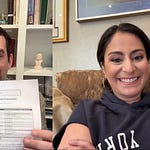Yesterday, I was joined in The Doctor’s Lounge on Substack Live by my friend and all-around good human Dr. Craig Spencer. As you can see in the preview picture, despite the serious content, we managed to sneak in a few laughs here and there.
Closed captions (㏄) and a transcript option (📄) can be found beneath the video playback control bar above.
"This session is free for everyone, thanks to recent upgrades that make it possible. (Join the community! Oh, and during the Q&A, I offered a special upgrade bonus for those who want to support this work and this community; anyone who upgraded yesterday or does so today, May 14, will get extra Premium time for free, more for yearly upgrades and founding members.)
Thank you for watching and sharing Inside Medicine in your network and wherever you do social media. —Jeremy
Highlights from The Doctor’s Lounge with guest Dr. Craig Spencer.
Aided by ChatGPT.
1. Letting Ourselves Be Real (00:00)
We open with a question: Are people like Craig and me reaching people as our authentic selves? Maybe being buttoned-up isn’t helping. What if the public saw our humanity—our irritations and our flaws. Look, I am a normal person who gets annoyed in the TSA lines, just like you!
2. Crossing the Divide on “Why Should I Trust You” (00:44)
Note: Items 2-10 were a redux of a fascinating podcast that Craig participated in recently.
Craig talked about joining a panel on the great podcast Why Should I Trust You that included public health leaders and members of the MAHA movement. The goal wasn’t to win on any particular point (be it ivermectin or vaccines), but to talk—something that almost never happens across these lines. The podcast included experts well known to the Inside Medicine community, including Craig, Dr. Megan Ranney, Dr. Katelyn Jetelina, Dr. Paul Offit, and others.
3. Shared Stakes, Shared Values (02:00)
As parents, we all want the same basics: healthy food, good doctors, safe environments for our kids. That overlap opened space for empathy—even when policies and beliefs differed. (More on empathy later on.)
4. Medicaid: The Unexpected Common Ground (04:30)
When someone on the podcast from the MAHA movement spoke emotionally about relying on Medicaid for her autistic son, we saw the conversation pivot. If both “sides” want to save Medicaid, maybe that’s a foundation to build on. This is highly topical in the news right now.
5. Getting Along Isn’t Enough (06:00)
Building rapport is easy. But shifting beliefs? That’s much harder. Personally, I worry that warmth and respect across these lines might make people dig in deeper, reinforcing their views instead of rethinking them. In other words, I am concerned that panels like the one Craig participated in might lower the toxic tone (which in itself is a huge benefit, I acknowledge) but not actually move the needle on the key scientific and medical questions we have to hash out.
6. When the Rubber Meets the Road (08:43)
The vibe of the Why Should I Trust You podcast changed when Covid-19 therapeutics came up. As Dr. Ranney mentioned, studies showed hydroxychloroquine and ivermectin didn’t work, but some (including MAHA supporters) couldn’t accept it. So the question was asked: what evidence would change their minds? No answers on this yet.
7. Science vs. Faith (12:00)
We reflected on Karl Popper’s idea that science is falsifiable. Good science updates with new data. But if your worldview isn't grounded in data, no study will change it. (Religion, therefore, is nonfalsifiable, because no data can alter someone’s beliefs.) That’s the barrier we're up against and this needs to be a part of the forthcoming conversations.
8. Humanizing the Scientist (14:00)
Dr. Paul Offit didn’t cite charts—he told a story. Twenty-five years developing a vaccine because he watched kids die of rotavirus. That didn’t make everyone pro-vaccine, but it reframed the debate. Sometimes stories work where data don’t.
9. We Ignore Evidence Too (17:00)
We highlight Dr. Lauren Westafer’s work on why even good doctors don’t always follow evidence—over-ordering CT scans, overtreating some pathologic blood clots called “pulmonary embolism” (Note: small ones may not need treatment, but bigger ones can be life-threatening). So, while we critique anti-science folks, we need to look in the mirror too.
10. Anti-Vax Messaging Hasn’t Changed in 200 Years (19:00)
Since the 1700s, anti-vaxxers have claimed vaccines are unsafe and unnecessary. What’s changed is how we counter them—and not always for the better. Data alone won’t win. We need new approaches, including forums like the Why Should I Trust You podcast, and other forms of engagement.
11. They’re Winning the Narrative War (22:00)
From slick town halls to TikTok-ready clips, the previously outsider/contrarian crowd that is now running HHS is doing a very impressive job dominating public health messaging. We’re nowhere close in our own messaging, and our counterparts during the Biden administration did nothing like what the current officials are doing. RFK Jr., Dr. Oz, and their pals are controlling the vibe—even if they’re wrong on some important facts. We need to think about both style and substance, both now and in the future.
12. What Our Students Are Teaching Us (27:00)
Something to give you hope: Craig’s global health students at Brown were assigned to think about real-world problems; they had to submit policy briefs for their final projects. Topics they chose included maternal transport in Burundi, medical tourism data gaps, and more. Their creativity reminded us that fresh thinking and short-form clarity can go a long way—and that the future of public health is bright, if we continue to invest in it.
13. Empathy Is Not a Weakness (38:00)
Craig has been writing about empathy lately. (Nothing has been published yet, but he’s been really excited about it in our usual calls and texts). Meanwhile, Elon Musk calls empathy a flaw. We clearly believe the opposite. The erosion of US funding and presence in global health is already costing lives. Empathy—and the will to act on it—is what made America respected. Losing it will cost lives and our prestige in the world.
14. We Need a Plan—And Better Messaging (42:00)
We closed with a reminder of the urgency of our mission. We must document the damage now. We must fight for Medicaid now. And, this is key, we must start planning for what comes next. If we want to rebuild, we need language, leadership, and a strategy. Breaking stuff is easy, as the current administration has shown. Building is harder—but it’s our job, and the work starts now.
What are your thoughts and reactions? Join the conversation in the Comments section!














Share this post